初三教材第4单元课文topic2
仁爱版教材九年级上册Unit 4 Topic 2阅读教学课设计
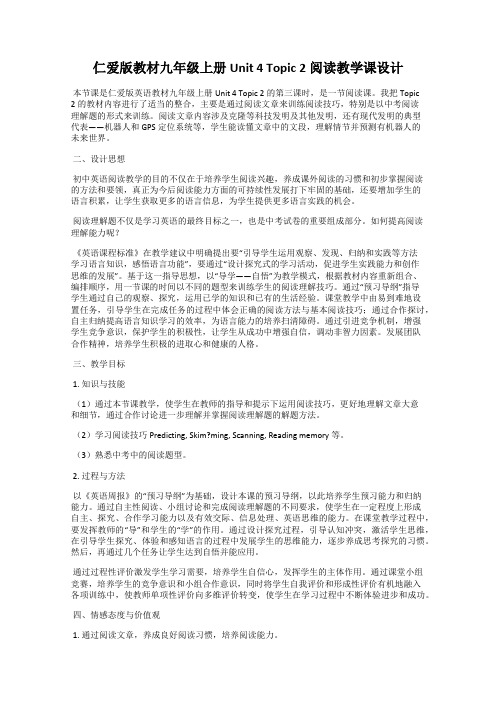
仁爱版教材九年级上册Unit 4 Topic 2阅读教学课设计本节课是仁爱版英语教材九年级上册Unit 4 Topic 2的第三课时,是一节阅读课。
我把Topic2的教材内容进行了适当的整合,主要是通过阅读文章来训练阅读技巧,特别是以中考阅读理解题的形式来训练。
阅读文章内容涉及克隆等科技发明及其他发明,还有现代发明的典型代表——机器人和GPS定位系统等,学生能读懂文章中的文段,理解情节并预测有机器人的未来世界。
二、设计思想初中英语阅读教学的目的不仅在于培养学生阅读兴趣,养成课外阅读的习惯和初步掌握阅读的方法和要领,真正为今后阅读能力方面的可持续性发展打下牢固的基础,还要增加学生的语言积累,让学生获取更多的语言信息,为学生提供更多语言实践的机会。
阅读理解题不仅是学习英语的最终目标之一,也是中考试卷的重要组成部分。
如何提高阅读理解能力呢?《英语课程标准》在教学建议中明确提出要“引导学生运用观察、发现、归纳和实践等方法学习语言知识,感悟语言功能”,要通过“设计探究式的学习活动,促进学生实践能力和创作思维的发展”。
基于这一指导思想,以“导学——自悟”为教学模式,根据教材内容重新组合、编排顺序,用一节课的时间以不同的题型来训练学生的阅读理解技巧。
通过“预习导纲”指导学生通过自己的观察、探究,运用已学的知识和已有的生活经验。
课堂教学中由易到难地设置任务,引导学生在完成任务的过程中体会正确的阅读方法与基本阅读技巧;通过合作探讨,自主归纳提高语言知识学习的效率,为语言能力的培养扫清障碍。
通过引进竞争机制,增强学生竞争意识,保护学生的积极性,让学生从成功中增强自信,调动非智力因素。
发展团队合作精神,培养学生积极的进取心和健康的人格。
三、教学目标1. 知识与技能(1)通过本节课教学,使学生在教师的指导和提示下运用阅读技巧,更好地理解文章大意和细节,通过合作讨论进一步理解并掌握阅读理解题的解题方法。
(2)学习阅读技巧Predicting, Skim?ming, Scanning, Reading memory等。
仁爱版英语九年级上册Unit4 Topic2 课文重难点讲解
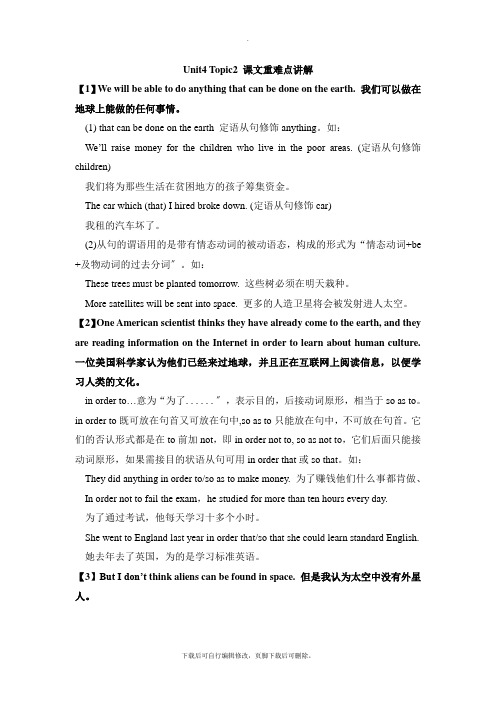
Unit4 Topic2 课文重难点讲解【1】We will be able to do anything that can be done on the earth. 我们可以做在地球上能做的任何事情。
(1) that can be done on the earth 定语从句修饰anything。
如:We’ll raise money for the children who live in the poor areas.(定语从句修饰children)我们将为那些生活在贫困地方的孩子筹集资金。
The car which (that) I hired broke down. (定语从句修饰car)我租的汽车坏了。
(2)从句的谓语用的是带有情态动词的被动语态,构成的形式为“情态动词+be +及物动词的过去分词〞。
如:These trees must be planted tomorrow. 这些树必须在明天栽种。
More satellites will be sent into space. 更多的人造卫星将会被发射进人太空。
【2】One American scientist thinks they have already come to the earth, and they are reading information on the Internet in order to learn about human culture. 一位美国科学家认为他们已经来过地球,并且正在互联网上阅读信息,以便学习人类的文化。
in order to…意为“为了......〞,表示目的,后接动词原形,相当于so as to。
in order to既可放在句首又可放在句中,so as to只能放在句中,不可放在句首。
它们的否认形式都是在to前加not,即in order not to, so as not to,它们后面只能接动词原形,如果需接目的状语从句可用in order that或so that。
外研版九年级上册英语Module4Unit2部分课文翻译
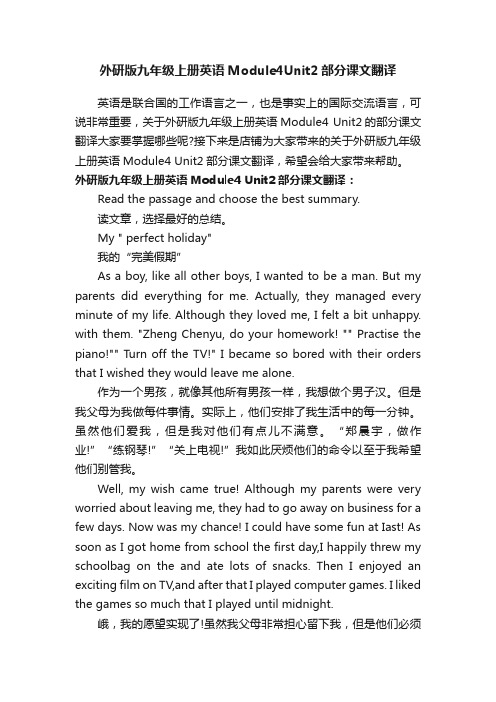
外研版九年级上册英语Module4Unit2部分课文翻译英语是联合国的工作语言之一,也是事实上的国际交流语言,可说非常重要,关于外研版九年级上册英语Module4 Unit2的部分课文翻译大家要掌握哪些呢?接下来是店铺为大家带来的关于外研版九年级上册英语Module4 Unit2部分课文翻译,希望会给大家带来帮助。
外研版九年级上册英语Module4 Unit2部分课文翻译:Read the passage and choose the best summary.读文章,选择最好的总结。
My " perfect holiday"我的“完美假期”As a boy, like all other boys, I wanted to be a man. But my parents did everything for me. Actually, they managed every minute of my life. Although they loved me, I felt a bit unhappy. with them. "Zheng Chenyu, do your homework! "" Practise the piano!"" Turn off the TV!" I became so bored with their orders that I wished they would leave me alone.作为一个男孩,就像其他所有男孩一样,我想做个男子汉。
但是我父母为我做每件事情。
实际上,他们安排了我生活中的每一分钟。
虽然他们爱我,但是我对他们有点儿不满意。
“郑晨宇,做作业!”“练钢琴!”“关上电视!”我如此厌烦他们的命令以至于我希望他们别管我。
Well, my wish came true! Although my parents were very worried about leaving me, they had to go away on business for a few days. Now was my chance! I could have some fun at Iast! As soon as I got home from school the first day,I happily threw my schoolbag on the and ate lots of snacks. Then I enjoyed an exciting film on TV,and after that I played computer games. I liked the games so much that I played until midnight.峨,我的愿望实现了!虽然我父母非常担心留下我,但是他们必须出差几天。
仁爱版九年级英语_unit4_Topic2_SectionC_PPT课件
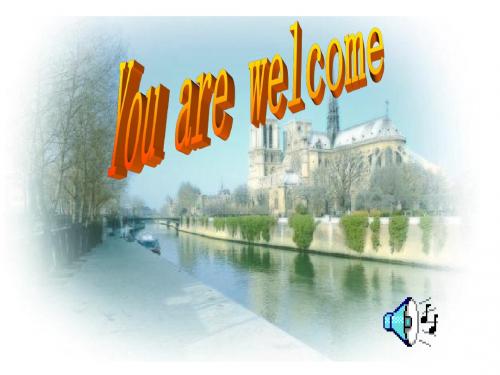
person’s house d. sure and confident,without any
doubts
Read the passage and underline the following words and expressions, then make sentences with the words to talk about robots,you can use the same sentences as the passage if you remember.
3.Do you think robots will be our masters in the future?
Listen to the passage and answer the following questions.
1.Are you sure that robots will be a part of life? 2.Will they be friendly? 3.Will robots create problems for humans?
warn sb not to do
The teachers often warn us not to swim in the river. 6. no longer “不再”=not ---any longer
You are no longer a little child./You aren’t a little child any longer.
Read the passage by yourself and discuss the following questions in groups.
九年级上册Module4Unit2Ibecamesoboredwit

P5 the life after parents were back
Part 3
Part1(Para.1) The life before his parents left
What did his parents do ?
1.Parents did everything for him. 2.Parents managed every minute of him. 3.Parents gave orders to him.
snack
/'mɪdnaɪt/ /'empt/
午夜;子夜
醒,醒来 提交,上交
空的 adj.
midnight wake up hand in
empty
/ʌn'eɪbl/
不能做某事的 adj. 整天
unable all day long
/bə:n/
v.(burned /bə:nd/, burned; burnt /bə:nt/)(使) (食物)烧焦, (使) 烤
事实上 adv.
管理,支配 v. 不高兴的 adj. 关掉,关闭(设备)
命令,指示 n. 担心
工作 n. 出差
(长) 沙发 n. 点心,小吃 n.
actually manage unhappy
turn off
order be worried about
business on business sofa
P1 the life before parents left
Part 1
P2 the experience during the first day
P3 the experience during the next morning
仁爱英语九年级Unit4 Topic2中文翻译

仁爱英语九年级Unit4 Topic2SectionA康康:嗨,玛丽亚!一部非常精彩的电影将要今晚上映。
我们一起去看吧?玛丽亚:太好了!是关于什么的?康康:是关于太空生活的。
玛丽亚:听起来好刺激。
康康:是的。
在影片里,所有人都可以乘坐宇宙飞船遨游太空,他们还可以拜访其他星球,例如火星。
玛丽亚:真的吗?康康,你觉得将来人们会在火星上居住吗?康康:是的。
我认为有一天我们会在太空中生活的。
房屋、学校和医院都会在火星上修建。
我们将可以做在地球上能做的一切事情。
玛丽亚:多有趣啊!我都迫不急待了。
Section B康康:玛丽亚,你听说了太空飞行去火星的电视新闻吗?玛丽亚:没听说过。
谁会参加这次飞行?康康:来自中国、美国和俄罗斯的宇航员。
他们要去太空探索关于火星的新发现。
我真崇拜他们。
等我长大了,我也想当一名宇航员。
玛丽亚:太棒了!不过,我觉得你应该先掌握一些基本的电脑技能。
康康:你说得对。
玛丽亚,你将来想做什么?玛丽亚:嗯,我还不清楚。
有时候,我想当一名舞蹈家,但是我想将来我会做一名科学家。
康康:为什么呢?我觉得你跳舞跳得很好啊!玛丽亚:不错,将来我肯定会在舞台上表演芭蕾。
但是相比较而言,我更喜欢科学。
它是我最喜欢的学科。
我对将来要被发现的事物感到很兴奋。
康康:太好了!我们努力学习吧!这样,我们就会实现我们的梦想了。
Section C你对火星的了解有多少?它长什么样?火星在太阳系中,是距离太阳第四远的星球,它以罗马战神玛尔斯的名字命名。
它的直径是地球直径的53%。
火星在距太阳约228,000,000千米处环绕着太阳转。
你可以清楚地分辨哪一颗行星是火星,因为它在夜空中是鲜红色,看起来像一个橘红色的圆球,非常漂亮。
但是在春夏两季,火星的表面会被强风暴覆盖。
火星表面的引力大约是地球引力的五分之二。
因此,一个在地球上称重90千克的人在火星上的称重仅36千克。
火星上的温度介于-138 ℃和28℃之间。
空气中的氧气含量仅为0.13%。
仁爱英语九年级英语上Unit 4 Topic 2 Section D 教学课件共15张PPT
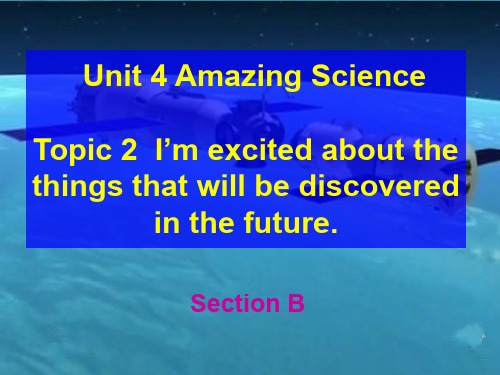
3. I’m excited about the things th_a_t_w_i_ll_b_e_d_i_s_co_v_e_r_e_d in the future.
4. Their dreams __w_il_l _b_e_r_ea_l_iz_e_d___if they
work hard.
Act out the
• Example : • A: `How is the `cake,
`Jane? • B: `Just a `minute. It
will be `finished `very `soon.
• A: The `article `says the `houses wi_ll_b_e_b_u_i_ltunder the `sea in the near `future. • B: It’s really `cool to `live under the `sea.
3a Look at the pictures and complete the sentences by following the example. Then read the dialogs aloud and pay attention to the stress and intonation.
future.
( F)
3. Kangkang thinks Maria can dance very
well.
(T )
4. Maria prefers dance to science. ( F )
1a. Look, listen and say.
1c Read 1a and complete the sentences.
• I really admire the astronauts. They can travel to space and discover something new about planets.
仁爱版九年级英语上册课件Unit 4 Topic 2 Section B 1

once.
She can be sent to _h__e_r__ g_r_a_n__d_m__o__th__e_r.
1b . Talk with your partner what you are going to be when you grow up.
4.Read and understand the following sentences. They will travel into space and discover something
New about Mars. I prefer science to dance. I’m excited about the things that will be discovered
3 John’s pet pig is ill.
1 The trees are dying.
2 Nobody looks after Sandy’s
daughter. 4
What should be done?
It should _b__e__re_p__a_i_r_e_d__ first.
It should _b_e____ _t_a_k_e__nto the _p__e_t_h_ o__s_p_i_t_a_l.
=achieve our dreams 实现我们的梦想
1b Pair work 1.Read 1a again. Discuss and complete the following sentences.
(1)Something new about Mars_c_a_n_ __b_e _ _d_is_c_o_ve_r_e_d by the astronauts.
仁爱英语 九年级上册Unit 4 Topic 2 课文翻译

Unit 4 Topic 2 课文翻译S ectionA-1aKangkang: Hi, Maria! A wonderful movie will be shown tonight. Shall we go to watch it?康康:嗨,马丽亚!今晚有一部很棒的电影要上映。
我们一起去看怎么样?Maria: Great! What's it about?马丽亚:好呀!是关于什么的?Kangkang: It's about life in space.康康:关于太空生活的。
Maria: That sounds exciting.马丽亚:听起来很不错。
Kangkang: Yes. All the people travel by spaceship in the movie, and they can visit planets like Mars.康康:是的。
电影里的人们都坐着太空飞船移动,他们还可以到火星这样的的星球上去。
Maria: Really? Kangkang, do you think people will live on Mars in the future?马丽亚:是吗?康康,你觉得以后人们会住在火星上吗?Kangkang: Yes, I think we will live in space one day.康康:嗯,我觉得有一天我们都会在太空生活。
Houses, schools and hospitals will be built on Mars.房子、学校和医院都会建在火星上。
We will be able to do anything that can be done on the earth.在地球上能做的事也能在火星上做。
Maria: What fun! I can't wait.马丽亚:太有趣了!我等不及了。
SectionB-1aKangkang:Maria, have you heard the news on TV about the space flight to Mars?康康:马丽亚,你有没有听电视上关于飞往火星的新闻呀?Maria:No, I haven't. Who will take part in the space flight?马丽亚:还没有。
仁爱英语 九年级上册Unit 4 Topic 2 课文翻译

Unit4Topic2课文翻译SectionA-1aKangkang: Hi, Maria! A wonderful movie will be shown tonight. Shall we go to watch it?康康:嗨,马丽亚!今晚有一部很棒的电影要上映。
我们一起去看怎么样?Maria: Great! What's it about?马丽亚:好呀!是关于什么的?Kangkang: It's about life in space.康康:关于太空生活的。
Maria: That sounds exciting.马丽亚:听起来很不错。
Kangkang: Yes. All the people travel by spaceship in the movie, and they can visit planets like Mars.康康:是的。
电影里的人们都坐着太空飞船移动,他们还可以到火星这样的的星球上去。
Maria: Really? Kangkang, do you think people will live on Mars in the future?马丽亚:是吗?康康,你觉得以后人们会住在火星上吗?Kangkang: Yes, I think we will live in space one day.康康:嗯,我觉得有一天我们都会在太空生活。
Houses, schools and hospitals will be built on Mars.房子、学校和医院都会建在火星上。
We will be able to do anything that can be done on the earth.在地球上能做的事也能在火星上做。
Maria: What fun! I can't wait.马丽亚:太有趣了!我等不及了。
SectionB-1aKangkang:Maria, have you heard the news on TV about the space flight to Mars?康康:马丽亚,你有没有听电视上关于飞往火星的新闻呀?Maria:No, I haven't. Who will take part in the space flight?马丽亚:还没有。
英语九年级Unit4__Topic2__SectionA(1)精品课件

1b
Pair work
Practice 1a with your partner. Then complete the following telephone conversation between Jane and Maria.
Maria: Hello! Jane: Hi, Maria!T_h_i_s_is__J_a_n_e_./_T_h_i_s_i_s_J_a_n_e_(_s_p_e_a_k_in_g_).
1a
Look, listen and say
Hello!
Hello, Jane! This is Kangkang.
1. Who is Kangkang calling? Jane.
2. Where would they like to go? They would like to go to West Hill.
How do you like this cap? How much is it? Can you guess?
guitar
I like playing guitar.
What do you usually do in your free time?
It is Sunday tomorrow. Would you like to go fishing with me?
3. What do they want to do? They want to go for a picnic.
Read and learn
(1)—Hello! —Hello, Jane! This is Kangkang.
(2)—Are you free this Sunday? —Yes. What’s up?
英语九年级Unit4__Topic2__SectionB(1)精品课件

③—Steve, how about flying a kite with me? —I’d like that, but I’m afraid I have no time.
2a
Listen, read and say
Telephone Message
From: Sally To: Maria Message: Call Sally back
this evening. Mom
2a listen, read and say
我可以和玛利亚通话吗?
副词,在家。 请问您是谁? 相当于at home
Choose the correct sentences to fill in the blanks.
2b
Work alone And then complete the telephone message.
1. No, he doesn’t. 2. He isn’t here now. 3. All right. I’ll tell him about it. 4. Could you ask him to call me back this afternoon? 5. May I speak to Li Ming, please?
Read
(1) It is a car. (2) Help yourselves. (3) Can I take your order? (4) There is a bus over there.
Summary
Learn the invitation:
①—Would you like to sing some songs with me? —I’m sorry I can’t. I have to cook.
仁爱版九年级Unit4Topic2 Section A教学设计

仁爱版九年级Unit4Topic2 Section A教学设计闽侯六中吴雅英一.教材内容分析:本节课是仁爱版九年级英语上册第四单元Topic2 When was it invented? Section A。
整个单元教学内容主要围绕科学技术展开。
本话题由科技发明展开,由康康的火箭模型引入火箭在航天中的作用,进而涉及克隆等科技发明及其用途。
最后以现代发明的典型代表——机器人和GPS定位系统结束。
主要语法为一般过去时的被动语态。
二.学生情况分析:1.学生是九年级学生,班级大部分学生英语较差,对英语有畏惧心理和学习困难。
2.学生对科技发明了解肤浅。
但又感兴趣,具有较强的求知欲和好奇心。
3.学生平时较少用英语与他人交谈并表达信息。
但对这一语法有一点的认识了。
4.初中阶段学生模仿,创造,思维能力较强。
三.教学目标分析(知识,技能,情感态度、价值观)1.知识与技能1、学习词组的区别和用法be made of / from …be used to do / for doing / as / by …allow sb. to do sth. / allow doing / be allowed to do sth.2、学习一般过去时的被动语态(was/were﹢past participle):学习句型:Where /When was it developed?3、功能与话题:1,学习表达希望和祝愿的句型。
2,谈论新科技及发明。
4,在语言技能上帮助学生提高听、说、读、写的综合能力。
培养学生观察、探究、感悟、归纳总结的自主学习能力,为终身学习和发展打下基础。
2.过程与方法(1)通过听力练习,锻炼英语听力理解能力;(2)通过自主说、两两对话等形式,提高口语交际能力和运用英语进行思维的能力,体验语言运用的过程与方法。
3.情感态度与价值观(1),能在小组活动中与他人合作,相互帮助,共同完成学习任务。
(2),对祖国的科技发展能有更深的了解。
九年级英语Unit 4 Topic 2 When was it made 湘教版知识精讲
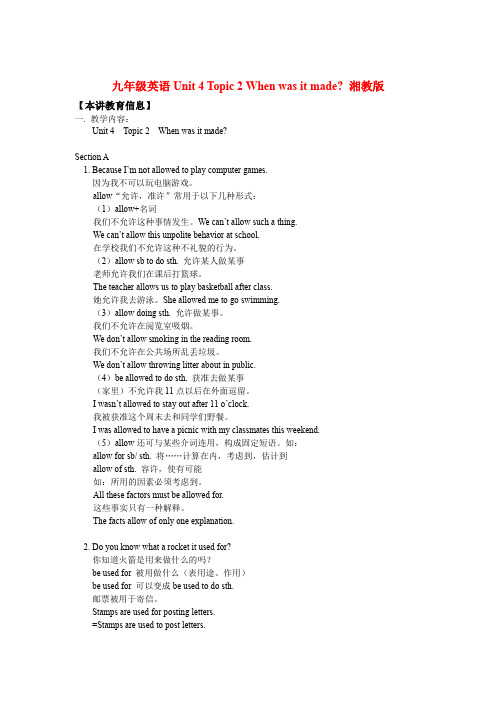
九年级英语Unit 4 Topic 2 When was it made? 湘教版【本讲教育信息】一. 教学内容:Unit 4 Topic 2 When was it made?Section A1. Because I’m not allowed to play computer games.因为我不可以玩电脑游戏。
allow“允许,准许”常用于以下几种形式:(1)allow+名词我们不允许这种事情发生。
We can’t allow such a thing.We can’t allow this unpolite behavior at school.在学校我们不允许这种不礼貌的行为。
(2)allow sb to do sth. 允许某人做某事老师允许我们在课后打篮球。
The teacher allows us to play basketball after class.她允许我去游泳。
She allowed me to go swimming.(3)allow doing sth. 允许做某事。
我们不允许在阅览室吸烟。
We don’t allow smoking in the reading room.我们不允许在公共场所乱丢垃圾。
We don’t allow throwing litter about in public.(4)be allowed to do sth. 获准去做某事(家里)不允许我11点以后在外面逗留。
I wasn’t allowed to stay out after 11 o’clock.我被获准这个周末去和同学们野餐。
I was allowed to have a picnic with my classmates this weekend.(5)allow还可与某些介词连用,构成固定短语。
如:allow for sb/ sth. 将……计算在内,考虑到,估计到allow of sth. 容许,使有可能如:所用的因素必须考虑到。
- 1、下载文档前请自行甄别文档内容的完整性,平台不提供额外的编辑、内容补充、找答案等附加服务。
- 2、"仅部分预览"的文档,不可在线预览部分如存在完整性等问题,可反馈申请退款(可完整预览的文档不适用该条件!)。
- 3、如文档侵犯您的权益,请联系客服反馈,我们会尽快为您处理(人工客服工作时间:9:00-18:30)。
6. including 包括 例:There are twelve players in our team, including Jim and me. 7. human being 可数名词,可解释为a man, a woman or a child, (man 可数名词指男人,不可 数名词指人类) 8. has been used 已经被使用 ★has/have +been+动词的过去分词
3. show 给……看 ★show sth to sb=show sb sth 把某物给某人看 例: Can you show your new watch to me? =Can you show me your new watch? ★show sb around 带领某人参观 例: Welcome to my city. I’ll show you around some places of interest
练习
一、用括号内所给词的适当形式填空 1. –Who is the little boy in the picture? --It’s me. The picture ____ (take) 10 years ago. 2. Many trees and flowers ____(plant) in our school last year, and they made our school a beautiful gardon.
★be used in 被用在…里 例: The hat was used in the play in the past. 6. Wish 希望,后面接that 从句常虚拟语气
通用 情况 从句 例句
动词的过去式(be I wish I know his telephone number. 现在 动词用were) I wish I were a bird. He wishes he had known had+过去分词 过去 the answer at that time. would/could+V原 I wish that she could go 将来 with us tomorrow.
4. be made of/from 由…制成 ★be made of (看得出原材料) be made from(看 不出原材料) 例: The desk is made of wood. Paper is made from wood. ★be made in 在…制造 例: The watch is made in Shanghai. ★be made by sb. 由某人制造 例: The model plane was made by my father.
4. Did he take an unbrella just now?(改为被动 语态) →___ an umbrella ___just now? 5. The cards were made by our teacher (对画线部分提问) →___ _____ the cards ___ by our teacher?
Do you know about Dolly. The famous sheep? She was created by cloning more than ten years ago in Scotland. Cloning is famous throughout the world. It is an experiment to make an animal that is exactly like its parent. So far scientists have cloned rabbits, sheep cows, mice, pigs and same other animals. ★be created by:通过 ★more than:多于 ★so far:至今
初三学校教材
育龙科教英语培训中心
When was it invented
★一般过去时的被动语态 结构:主语+be(was/were)+及物动词的过去分词 例: book was finished last month. The These old buildings were buit thousands of years ago. Tom found the lost book two years ago.(变为 被动语态) →The lost book was found by Tom two years ago.
Michael: Thomas Edison. It’s said that Edison invented more than one thousand things during his life. ★it’s said that:据说 ★more than:据说 ★druing:在…期间 Jane: What about the radio? Michael: The radio was invented by Guglielmo Marconi in 1895. Jane, let’s go this way. Look! An airplane, but it’s different from today’s planes. ★be different from:不同于… Jane: Yes. It was invented by Wilbur and Orville Wright in 1903 ★invent 发明 →invite 邀请
1. in people’s daily life = in our everyday life 2. It’s said that… 据说… ,所说… 例:It’s said that you have sent him three letters. ★It’s reported that… 据报道… 3. during one’s life=in one’s life 某人一生 例:Lei Feng did a lot of things during/in his life. 4. invent v. 发明 invention n. 发明 inventor n. 发明家 5. go this way 走这边=take/come this way
1. be allowed to do sth 被允许做某事 allow sb to do sth 允许某人做某事 allow doing sth 允许做某事 例: I’m not allowed to have a picnic with my ①I’m friends. ②She allowed me to go fishing. ③We don’t allow smoking in the reading room.
★一般过去时的被动语态否定式和疑问式要在助动 词was, were 上变化: ①陈述句:This movie was shown last week. ②否定句:The door wasn’t locked at night. ③一般疑问句:-Was the bridge buit in zoo? -Yes, it was. / No, it wasn’t.④ ④特殊疑问句:-Who was the TV set invented by? -I don’t know.
Kangkang: Jane, why are you unhappy? Jane: Beacause I am not allowed to play computer games. ★allow sb to do sth Kangkang: It’s bad for your health if you spend too much time on them.(条件状语从句) ★on:在…上 Jane: Maybe you’re right. Kangkang: look at this. (Kangkang shows a model to Jane.) ★model:由…制造 ①be mode of :看出原材料 ②be made from:看不出原材料
练习
二、按括号内要求改写下列句子 1. Tom finished the work last week.(改为被动语 态) →The work ___ ____ ___ Tom last week. 2. All the salt here was produced in South China.(改为一般疑问句) →___ all the salt here ____ in South China? 3. Betty gave me an eraser a moment ago(改 为被动语态) →An eraser ____ ___ ____ me a moment ago.
(Michael, Jane and their classmates are visiting the Science Museum.) Michael: Look, a light bulb! Jane: Yeah. In the past , it was widely used in people’s daily life. Do you know when it was invented? ★in the past:在…过去 ★widely: 副词修饰动词 ★daily life:日常生活 Michael: It was invented in 1879. ★be invented:被动语态 Jane: Who invented it?
5. be used for 被用来做… 例: Pens are used for writing. ★be used to do sth. 被用来做… 例: Pens are used to write. ★be used as …被用作 例: English is used as a foreign languge in china. ★be used by 被谁所用 例: English is widely used by many people from different countries.
